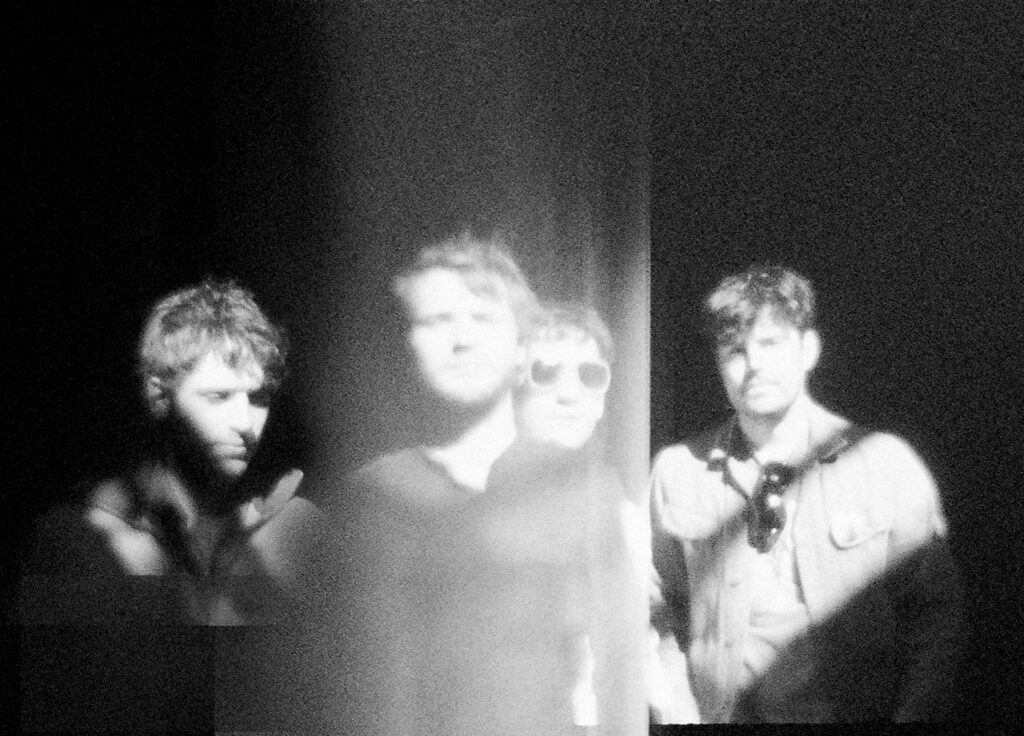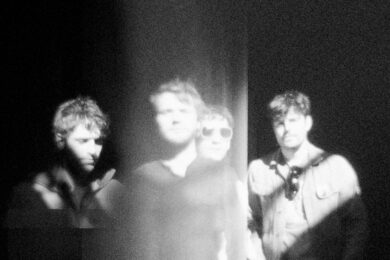If you thought that all music from Montreal post-Arcade Fire was going to be big, ornate guitar-rock, then think again: Suuns are dark and dexterous, and their debut album Zeroes QC has been one of the most impressive to reach Quietus towers this year. Drawing upon a myriad of styles and influences ranging from Can to Cabaret Voltaire, it’s an oddly unsettling listen as experimental instrumentation is pushed to the fore while eerie, displaced vocals lurk in the background.
The band – consisting of singer and guitarist Ben Shemie, bassist and guitarist Joe Yarmush, drummer Liam O’Neill and bassist and keyboardist Max Henry – originally performed as Zeroes before deciding to change their name to avoid any potential legal snags. Paying homage to their former moniker with Zeroes QC, they recorded the LP in just two weeks. Keeping things in check, as Henry explains, is crucial. "I think restraint is very important in the band, and in the compositions," he says today. "That was pretty much the only thought we had."
The Quietus caught up with Henry to discuss scaring fans, the Montreal scene and why it’s good to be sexy.
So how did Suuns form?
Max Henry: Let me see… I’ll give you the abridged version. We were all in Montreal – although only Ben is from Montreal proper. We all just happened to be there. Liam and I were there for school. Ben and Joe had started wanting to get some tunes together. They got Liam, and Liam found me, and that was about three years ago.
So you were the final piece of the jigsaw, so to speak?
MH: [Laughs] That’s right. It all came together pretty quickly.
How soon after the band beginning did you join?
MH: They had done one demo, but it was a very piecemeal arrangement at that point. Nothing was solidified, really. It only existed long enough to record something. We came together pretty quickly as Zeroes, and it’s been exactly the same for three years.
So why did you change the name from Zeroes to Suuns?
MH: Oh, it’s really not too interesting. There was some concern when we were going to sign that there might be some problems with the name legally. But no-one actually threatened us; some people have started printing that, which isn’t great. In fact, we did speak to ‘the Mexican Ramones’, Zeros, and they were really cool. They didn’t mind at all if we used their name. But they warned us that even they’d run into problems using the name, or continuing to use the name, because other people had already laid claim to it.
Was it a bit of a wrench, having to change it?
MH: It was tough. It was a hard thing to do, because we felt we were starting to get a small following with the shows we had done as Zeroes, and we felt that changing the name was like turning your back on everyone that supported you so far and saying, ‘Well, fuck you guys’. But we just had to do what we had to do, I guess.
Was calling the album Zeroes QC a tribute to the former moniker?
MH: Oh, absolutely. I mean, even naming the new band – that took a fucking long time. And look what we came up with… it has a couple of superfluous vowels.
It’s the Thai translation of ‘Zeroes’, isn’t it?
MH: That’s exactly it. Which is maybe a little geeky, and we don’t really have any particular affiliation to Thai. But I think it’s kind of cool just because … to try and find a new name is a joke, you know? Everything has been taken a hundred times over. I see it more as just a gibberish name. But it’s fairly unique, I suppose. And it’s fairly easy to search for.
The ‘QC’ of the title stands for Quebec, and Jace [Lasek] was involved on production of the record. How much of a connection do you feel to the area?
MH: It’s interesting to say… Montreal, we feel very connected to. It’s a very tight knit community, and it’s quite small and incestuous in a way – in a good way.
If incest can ever be good.
MH: [Laughs] Yeah. But obviously we love Jase. Quebec… I feel like we’re more aligned to Montreal, than Canada in general. But being Canadain we’re very proud of Canadian things… [like being] kind of underdogs.
Would you agree that Zeroes QC is a sinister and dark record?
MH: Yeah, I think it is. That was something that struck me as very refreshing when I started playing with the band and they had a few tunes together; it’s a side I don’t often get to explore on stage. And at the very beginning, when we were playing and no-one knew what to expect from us or had seen us at all, I found that we ended up scaring people. I thought that was really great, because you play so many shows where no-one gives a fuck who you are, and [then] you play and it’s done. So it’s very empowering to elicit such a strong response.
How could you tell they were scared?
MH: Well, there was an effort to be scary a little bit. And I would be scared to. It’s hard to know how react. Plus, because we didn’t have the leverage of choosing which gigs we were playing, often it would be a very typical Montreal band with guitars and strings… and then us.
There’s a difference between being dark and being depressing though, right? Because parts of the album are pretty positive. Parts are quite sexy.
MH: You know, I never really heard that that much, but that’s a word that people have been using a lot.
Which word? Sexy? I think it’s a compliment.
MH: Oh yeah, I think that’s great. I think that’s wonderful. It’s a strong emotion, so I’m glad we can elicit that.
It’s nice to be able to help people out in that way, I imagine.
MH: [Laughs] That’s right.
One of the things I really like about the album is that despite all the complexity it has, there’s still something really simple about it; like the way vocals are used more as just instrumentation, rather than for the words themselves.
MH: Yeah, absolutely. We come from a very strong instrumental background. Some of us are jazz expatriates, and the words came very much as an afterthought. I mean, I can’t speak for the others completely, but from what we’ve talked about, a lot of it has to do more with the sound of the words and the percussive quality. But it’s nice to have words in there, even if we’re an instrument driven band. It appeals to a different part of the brain.
Pie IX by Suuns from Secretly Jag on Vimeo.
There’a a lot of different styles and influences on the record – was it difficult to maintain a sense of coherency, and identity?
MH: That’s another interesting one. It’s strange, because we’ve never struck ourselves as being diverse, but once you play the tunes you don’t really hear them yourselves any more. But yeah, it is important. We aren’t young, necessarily, but we’re new – and I think it’s important to maintain a voice. But we just follow our guts and see what happens.
And do you think you managed it?
MH: I think so. I do… but what the fuck do I know? I’m not listening to the record anymore. But I feel it can be a sign of weakness – it’s kind of like an obsequious first date when there’s a band who go through seven different styles on the same record. I think it can be a sign of immaturity, and I’m sensitive to that. But I don’t think we’re guilty of that, for some reason – maybe I just don’t hear it, but I think we’re pretty cohesive.
What do you hope people make of Suuns?
MH: I hope they dance. And that they dig it. If they just know it, that’s fine. It doesn’t matter if they like it or not.
Suuns will play the following UK tour dates: 22 February – Deaf Institute, Manchester; 23 February – CAMP, London. Zeroes QC is also out now.



